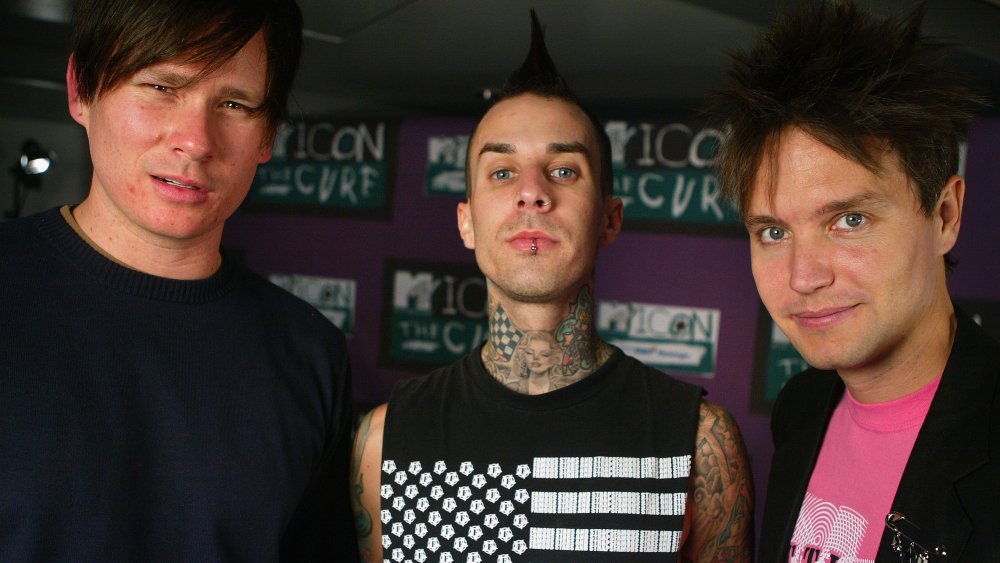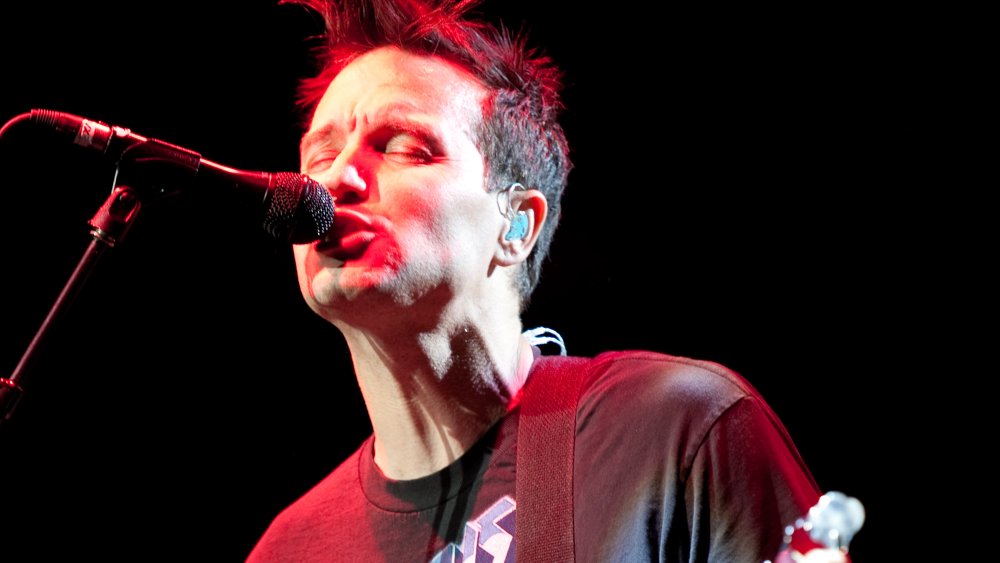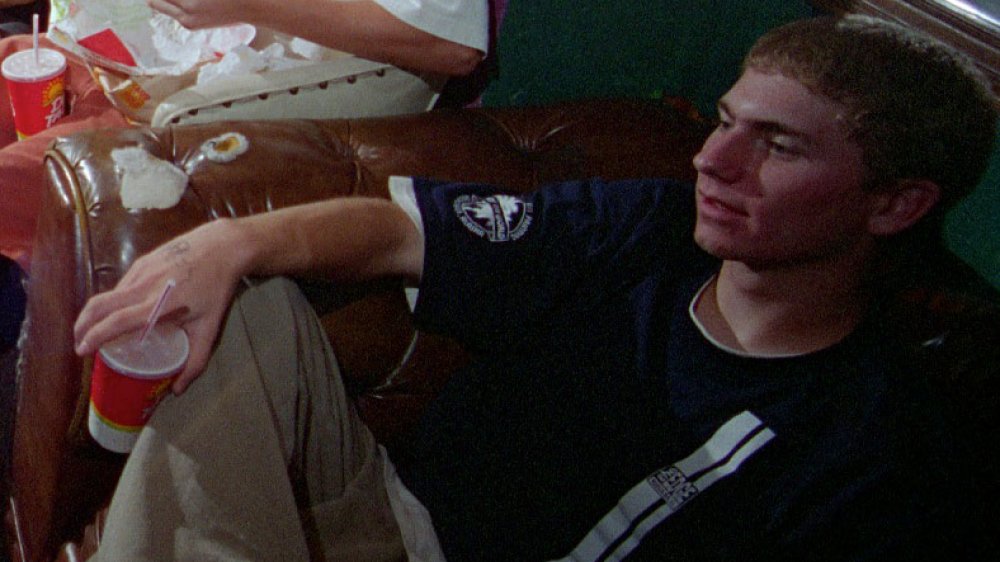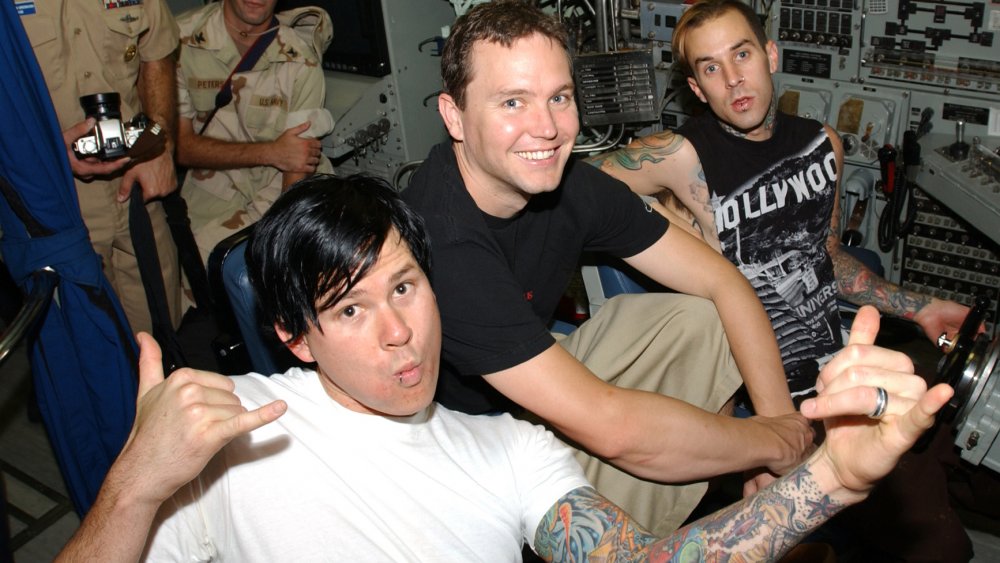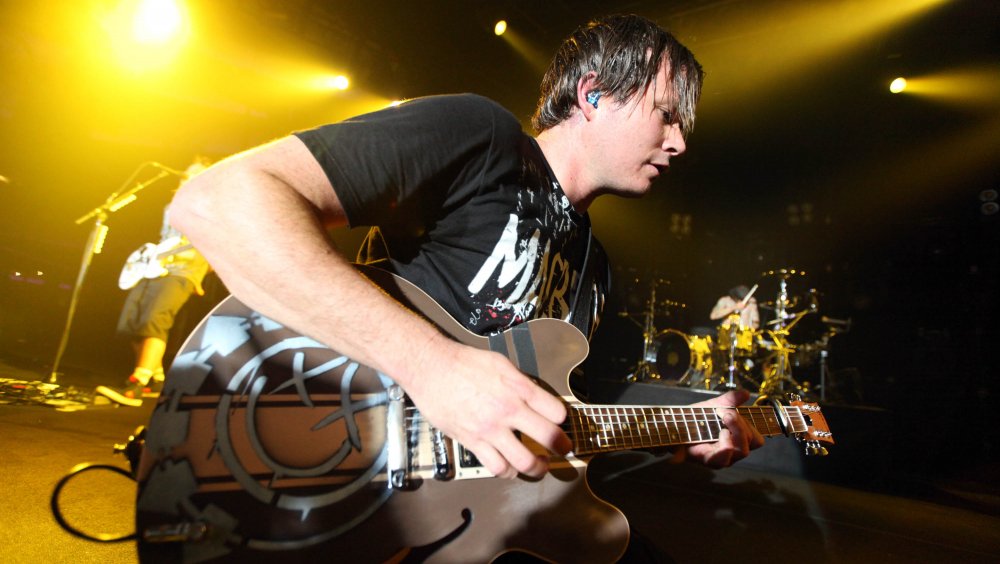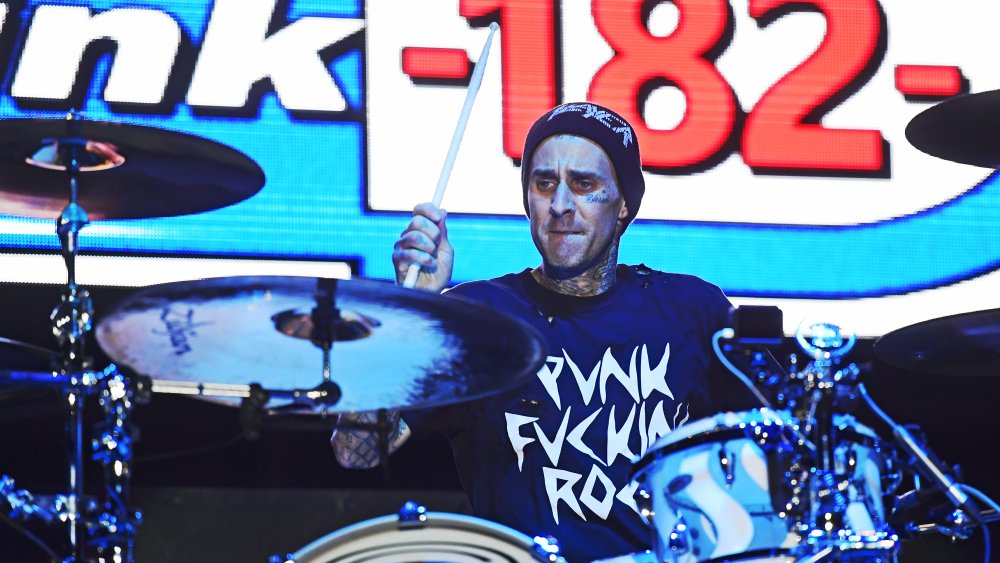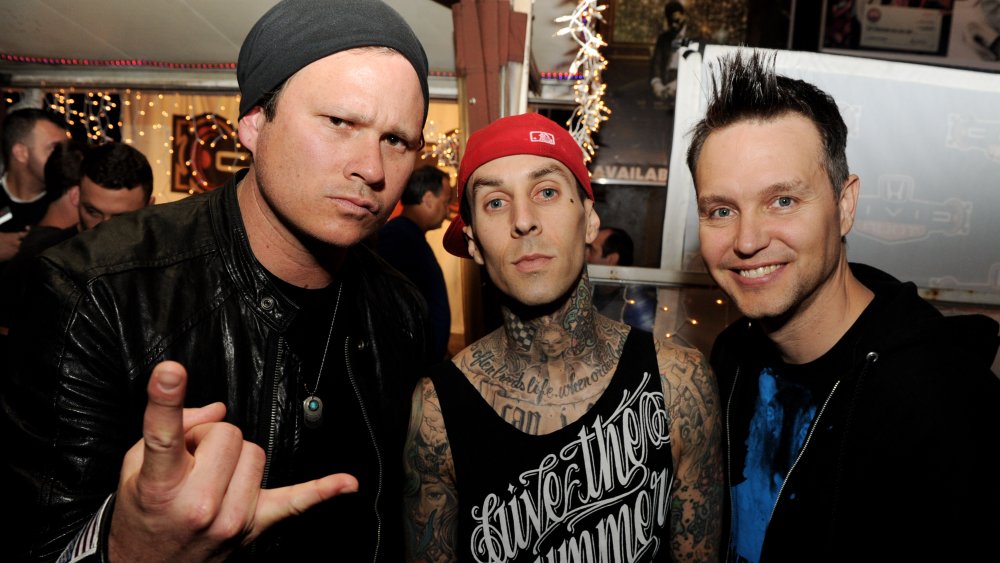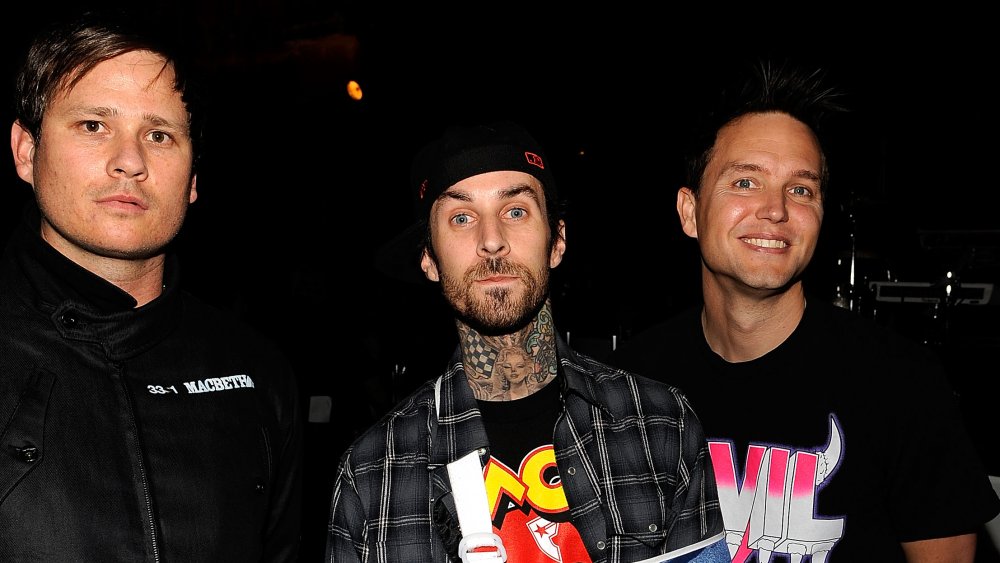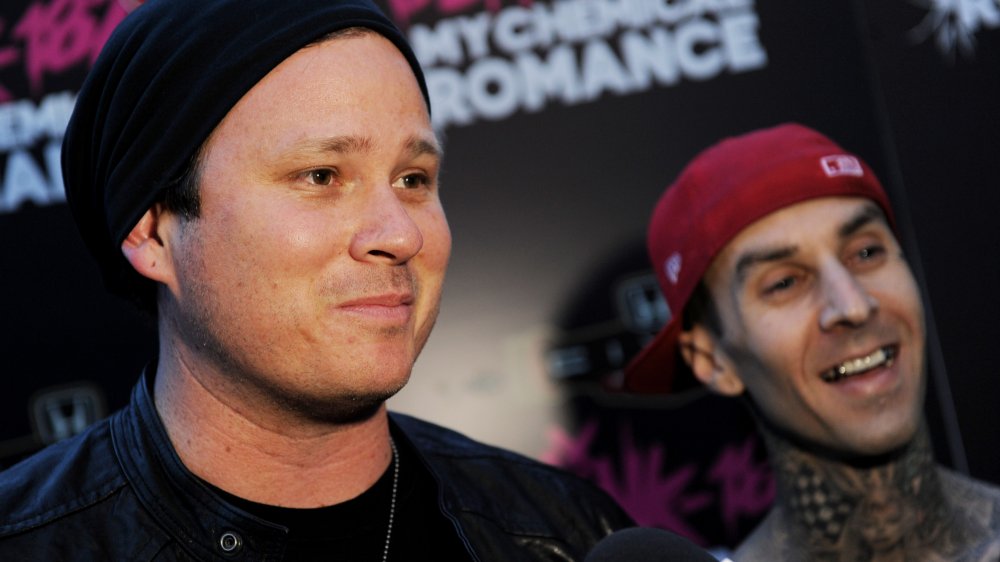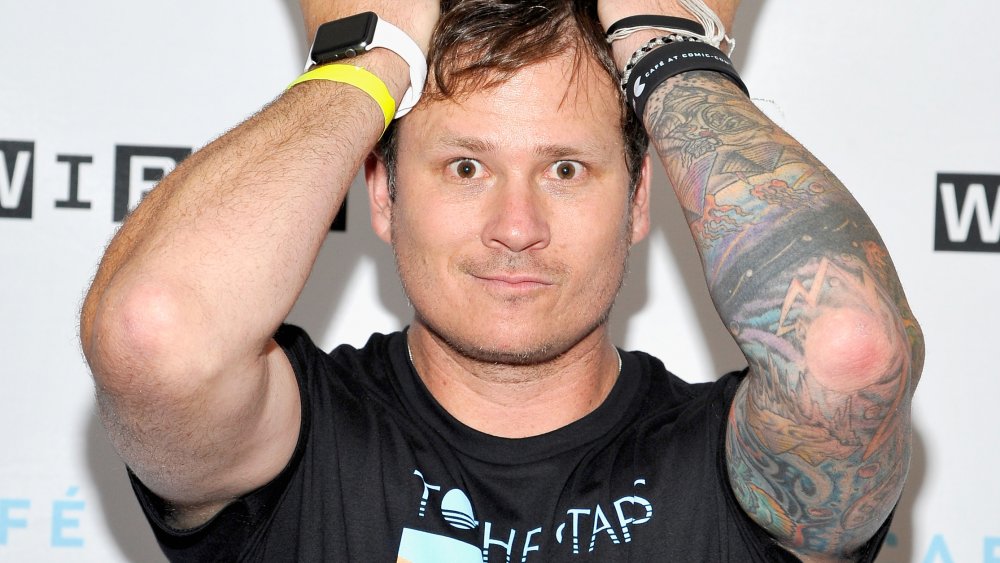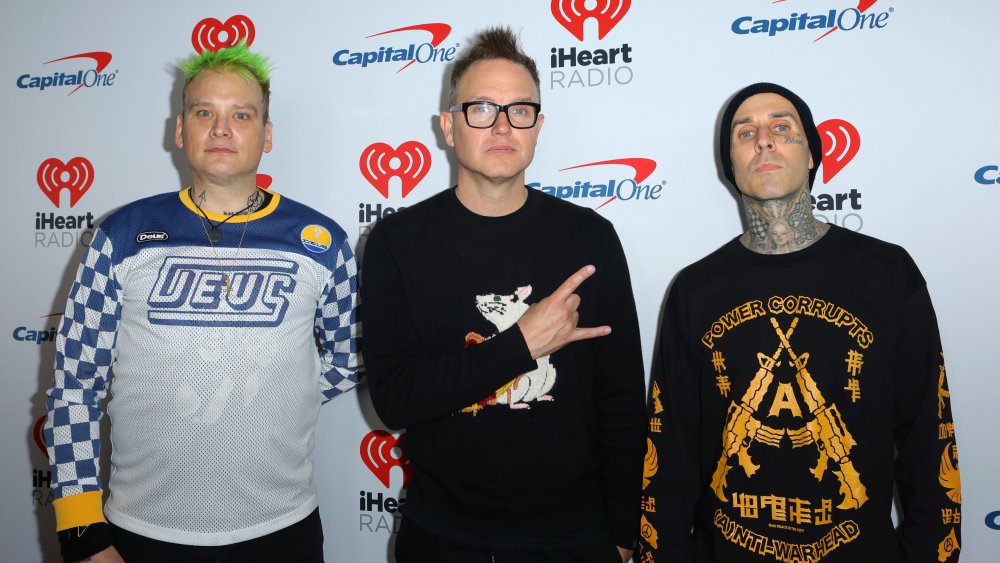The Tragic Real-Life Story Of Blink-182
San Diego rock trio Blink-182 is probably known for their irreverent toilet humor and crass stage banter as much as they're known for being one of the pioneering, defining pop punk acts of their era. And if you were one of the tens, if not hundreds, of millions of people who simply couldn't escape their upbeat, often silly, and always thoroughly catchy tunes in the early aughts, you might be under the impression that all the group cared about while they reshaped modern rock was teen angst, breakups, and fart jokes (at least until later records like 2003's Blink-182 and 2011's Neighborhoods showcased a willingness to explore more mature territory). Behind the scenes, though, the band endured more than its fair share of brutal trials and tribulations. From lawsuits to firings and fights to crashing planes, this is the full, tragic, real-life story of one of modern rock's most influential bands.
The story behind Blink-182's name
Blink-182 didn't intend to kick off that weird, late '90s/early '00s trend where bands would attach meaningless words to equally meaningless numbers (think Sum 41 and Matchbox 20). Originally, after briefly trying on and discarding names like Duck Tape and Figure 8, they were simply called "Blink." That name stuck for quite a while, too, through early garage hangouts, late night songwriting sessions, early club appearances throughout Southern California, and even a handful of mini tours in the San Diego area. In fact, 1994's Buddha, the band's first notable release, bore the name Blink on it.
It wasn't until the following February's Cheshire Cat, the group's full length debut through SoCal punk label Cargo Music, that the group had to revisit their name. Turns out, an Irish band of the same name had caught wind of the San Diego punk outfit and threatened to sue. Unwilling to go to legal war over something so silly, Cargo Music demanded the band change their name, or they'd change it for them. So, someone slapped a meaningless -182 to the end, and the rest is history.
Blink-182's original drummer was fired
The original lineup of Blink-182 consisted of bassist/singer Mark Hoppus, guitarist/singer Tom DeLonge, and drummer Scott Raynor. But only the first two would stick around long enough to enjoy the band's titanic commercial success at the turn of the millennium. See, 1995's Cheshire Cat, featuring fan-favorite deep cuts like "Carousel" and "M+M's," had earned the group some very real major label buzz. All three members were fully willing to ditch their label, Cargo Music, who they perceived as being ambivalent towards the band and unable to support them as their popularity grew. However, the members couldn't agree on which label to sign with.
Raynor had a particular affinity for Epitaph Records, so when the band overruled him and went with MCA for 1997's Dude Ranch, he began to lose interest in the band entirely. There's a bizarre lack of verifiable details out there regarding what exactly happened. One rumor says Raynor was fired in the middle of the Dude Ranch tour for alcohol abuse. Another claims he simply left to go back to school. Either way, the band was rid of him by 1998 and filled the kit with then-Aquabats stickman Travis Barker, cementing the classic lineup. As legend has it, Barker was only asked to fill in for a set or two, but he then proceeded to master the songs in less than an hour and knock the gig out of the park that same evening. He was hired full time shortly after, and the band never looked back.
Tom DeLonge hurt Mark Hoppus' feelings
"Dammit (Growing Up)," the lead single off 1997's Dude Ranch, became a staple of national rock radio and earned the band some serious industry buzz. But it was 1999's Enema of the State that turned them into verifiable superstars. The album, which has since gone on to sell a jaw-dropping 15 million copies, blew the lid of the pop punk genre and has since gained a legacy as one of the most influential rock albums of the last 30 years, paving the way for the success of groups like Paramore, Fall Out Boy, and Sum 41. 2001's Take Off Your Pants And Jacket, with hits like 'First Date', 'Stay Together For The Kids', and 'Rock Show' serving as the nose cone of the rocket, went on to sell another 14 million copies.
By the time the group wound down from that release, they were one of the most popular bands around and had effectively run out of accomplishments to chase. Furthermore, all three members were pushing 30 and had become fathers. Tom DeLonge was torn between the band, his new duties as a father, and his desire to grow creatively through other projects, like the short-lived band he and Travis Barker formed: Box Car Racer. But not everything was all sunshine and roses. Hoppus was apparently stung by being left out of Box Car Racer, and the attached-at-the-hip relationship he and DeLonge had enjoyed up to that point, already strained by fame and fortune, took a serious hit.
The time that Blink-182 went on indefinite hiatus
Recording sessions for 2003's Blink-182 (or just Untitled) had been tense. After all, Tom DeLonge wanted to veer away from the group's characteristic pop punk tone and comedic lyrics and pursue heavier, more experimental sounds. It's hard not to notice when you listen to the record. Critics loved the band's newfound maturity, and fans lapped up the hit single "I Miss You." However, the album largely undersold expectations. (Of course, it's since gone on to sell a still-impressive 7 million copies).
As is the case with any new release, an extensive, grueling tour was scheduled. DeLonge, already suffering from chronic back pain and wanting desperately to spend more time with his new family, asked the group for a half-year break. Understandably not wanting to risk the band's momentum with such a long pause, the group pushed back. DeLonge later said he felt like they were forcing an ultimatum on him. Unwilling to choose the band over his family, he pulled away, and all future plans for the band were scrapped on the spot. To the devastation of long-time fans, Blink-182 announced an "indefinite hiatus" in February 2005.
The members struggled to cope with the breakup
Although the phrase "indefinite hiatus" seemed to be carefully selected to dismiss concerns of a full breakup, the band was, in effect, done for by spring 2005. Hoppus and Barker decided to soldier on, forming the band +44. That project's debut, When Your Heart Stops Beating, received mixed reviews and went nowhere commercially. DeLonge, still licking his wounds from the band's split, vanished from public life for months before re-emerging to announce his next project, alternative rock quartet Angels & Airwaves. However, his bizarre statements (such as calling the new project "the greatest rock and roll revolution for this generation" and claiming it would usher in an "entire new culture of the youth") were widely mocked. He later attributed both grandiose comments, and others, to a post-back surgery painkiller addiction.
Regardless, both of that group's early albums, 2006's We Don't Need To Whisper and 2007's I-Empire, were certified gold but fell far short of the success Tom enjoyed in Blink-182. Meanwhile, drummer Travis Barker and his wife, then-Miss USA Shanna Moakler, dove into the world of reality TV with Meet the Barkers, which chronicled their struggles as a couple, and they became tabloid fixtures. During all this, Hoppus, creatively lost, decided to start a podcast and try his hand at music production, with his biggest project being old tour-mate Motion City Soundtrack's Commit This to Memory.
Blink-182 was driven back together by a pair of tragedies
In August 2008, friend of the band and producer Jerry Finn (who'd also produced for Green Day, Sum 41, Rancid, AFI, and Alkaline Trio) died of a sudden cerebral hemorrhage at the young age of 39. Barely a month later, Travis Barker was one of only two survivors of the deadly 2008 South Carolina Learjet 60 crash (the other being friend and collaborator Adam Goldstein, also known as DJ AM, who died of an overdose a year later). The other four people on board died. Barker, reeling from third-degree burns and PTSD, spent weeks recovering in the hospital.
In a 2008 blog post (via MTV News), Hoppus describes the back to back tragedies as "the hardest times" he could remember. DeLonge and Hoppus both visited Barker in the hospital and frequently saw each other there. It was the first time they'd spoken since the band split. Once Barker was discharged, the group stayed in touch and met at Hoppus and Barker's studio in Los Angeles that October. According to Hoppus, the trio had "two gnarly heart-to-hearts," in which they all spoke at length about the events leading up to their 2005 split and the resulting pain. DeLonge then broached the subject of a reunion by asking, "Where are your heads at?" Hoppus responded, "I think we should get back on the road and back in the studio and do what we love doing."
Even after Blink-182 got back together, there was a lot of tension
The trio announced their official reunion at the 2009 Grammys before embarking on an extensive and star-studded 2009 reunion tour, featuring opening acts like Fall Out Boy, Weezer, All-American Rejects, All Time Low, and Panic! At The Disco, among others. In 2010, they sat down to record Neighborhoods, the long-awaited followup to the band's 2003 release. Without the late Jerry Finn at the helm, who'd produced Blink's last three records and acted as an effective mediator and fourth member of the band during that time, the group decided to self-produce the record.
This proved problematic.
The lack of authority and structure caused the album's release to be repeatedly postponed, and tensions immediately began to resurface. Rather than blocking out a few weeks to tackle the album, the band decided to do it in spurts. They'd fit recording sessions around their personal lives and side projects, like DeLonge's ongoing Angels & Airwaves commitments and Hoppus' Fuse TV show, Hoppus on Music, which he flew to New York every week to record. Hoppus even interviewed Angels on one episode during this period, where tensions were clearly visible but played for laughs. (At one point, Hoppus comically called Angels & Airwaves the band Tom DeLonge was "cheating on him with.") "We weren't even in the same room," DeLonge later said of the album's recording process. "We were barely talking. We were in different studios. ... Everyone was on eggshells."
Sales for Neighborhoods failed to meet expectations
Neighborhoods was released to widespread excitement in 2011, but while critics lightly praised Blink's creative "growth spurt" featured on the record, fans were more lukewarm about the album's darker lyrical content and lack of stand-out pop punk anthems on the order of "All The Small Things" or "First Date." Sure, singles "Up All Night" and "After Midnight" did reasonably well on rock radio, but they had a limited splash on Billboard's Hot 100 ("Up All Night" peaked at #65 there). The album itself debuted at #2 on the Billboard 200, with first week sales of 151,000 units.
For comparison, though, 2001's Take Off Your Pants and Jacket debuted at #1 with sales in excess of 350,000 in its first week. Neighborhoods quickly tumbled out of Billboard's top 20 albums and was only certified gold in Australia. Referring to the downsizing of then-label Interscope Records' rock music department in response to waning public interest in the genre, Tom DeLonge said to Billboard, "The label itself has no resources or capital to do what they used to." Billboard later remarked that when the dust settled, total sales for Neighborhoods were generally perceived to be underwhelming.
Tom DeLonge lost interest in the band again
Despite the rocky reunion, Blink-182 continued to tour throughout the early 2010s, embarking on a 2011 Honda Civic Tour with My Chemical Romance, headlining the Reading and Leeds festival in the UK, and celebrating the ten year anniversary of 2003's Blink-182 with a handful of shows. Behind the scenes, however, DeLonge once again began to distance himself from the band and recommit to other projects (like Angels & Airwaves and an ongoing obsession with conspiracy theories and UFOs). A brief cancer scare also sidelined him for a time, although he's since been declared clean and healthy. He even started a breast cancer charity, Boomerlovesboobies, based on his "Boomer" character in the "First Date" video.
As for the other members of the band, they weren't especially pleased with DeLonge's behavior. As Travis Barker said in an interview with Rolling Stone, he wished DeLonge would just admit that he didn't want to play with them and that he only wanted to do shows for the money. Adding insult to injury, plans to record a seventh album were, as had been the case with Neighborhoods, consistently pushed back to accommodate other commitments. Speaking with Rock Sound, Barker explained, "I'd do interviews and I just felt awful for fans because they were promised albums for years and we couldn't do it." In other words, things were super intense yet again.
DeLonge left Blink-182
In 2014, DeLonge's manager informed the rest of the group that his client was leaving the band indefinitely to pursue "non-musical" interests. Hoppus and Barker then decided to move on without him. Their statement came as an unwelcome shock to both fans ... and DeLonge himself. DeLonge called the legitimacy of the report into question on a January 26, 2015 Instagram post that begins with, "To all the fans, I never quit the band." As more news trickled in, however, it became apparent he was indeed no longer with the group.
Some time later, Hoppus and Barker addressed the confusion with Rolling Stone and blasted DeLonge as "ungrateful" and "disingenuous," while citing email exchanges with DeLonge's managers that, if accurately quoted, don't seem to leave much room for ambiguity ("Tom. Is. Out," being one). In the same interview, Hoppus remarked that the events leading to DeLonge's dismissal were eerily similar to those leading up to the band's 2005 "indefinite hiatus," and that he was therefore disappointed but not surprised. Barker then claimed that he and Hoppus had spent the last several years covering for DeLonge when explaining the extensive time it was taking for a Neighborhoods followup. He then added, "Why Blink even got back together in the first place is questionable."
Blink-182 soldiered on with Matt Skiba
Regardless of the competing narratives, Tom DeLonge officially left Blink-182. Alkaline Trio guitarist/singer Matt Skiba, with whom Hoppus had been interested in collaborating for years, was tapped to replace Tom at a number of 2015 shows. When the legal intricacies were hammered out with DeLonge, Skiba was added to the band as an official replacement and has been with them ever since.
Soon after, Blink's 2016 release, California, was heavily promoted and was the band's first #1 on the Billboard 200 since 2001. The album sold well and earned the group their first Grammy nomination for Best Rock Album, but despite glowing reviews for lead single "Bored to Death," the album as a whole received mixed reviews due to its formulaic nature. Then, 2019's Nine debuted slightly lower at #3 but was better received.
As for DeLonge, he's continued with Angels & Airwaves and various other business ventures relating to art and his UFO obsession. For example, To the Stars Academy, Inc. (now known as To the Stars Academy of Arts and Sciences) is an ongoing project merging various art projects with aerospace engineering projects (yes, really) and UFO truthism. As of October 2018, the project is enduring financial hardships resulting from an inability to crowdfund a starship the company planned to build with, and sell to, the US military. On a lighter note, DeLonge and his former bandmates appear to be on friendly terms, hopefully leaving the door open to future collaborations.
